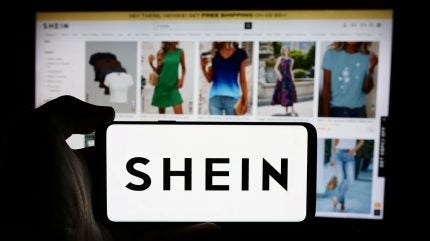
Fast-fashion giant Shein is set to open its first permanent physical outlets in France as a trial initiative.
This marks a shift from the China-founded and Singapore-based brand’s previous reliance on temporary pop-up stores in various cities.

Discover B2B Marketing That Performs
Combine business intelligence and editorial excellence to reach engaged professionals across 36 leading media platforms.
The new outlets will be housed within the BHV department store in Paris and Galeries Lafayette stores across Dijon, Grenoble, Reims, Limoges and Angers.
The BHV location is scheduled to open in early November 2025, with subsequent launches in the Galeries Lafayette sites to follow.
This expansion comes through a collaboration with retail property group Société des Grands Magasins (SGM).
The move will create an estimated 200 jobs in France.

US Tariffs are shifting - will you react or anticipate?
Don’t let policy changes catch you off guard. Stay proactive with real-time data and expert analysis.
By GlobalDataHowever, Galeries Lafayette has voiced strong opposition, arguing that the arrangement breaches its franchise agreement with SGM, under which the stores operate using the Galeries Lafayette name.
The retailer has stated that it intends to block the launches.
Reuters quotes the group: “Galeries Lafayette profoundly disagrees with this decision with regards to the positioning and practices of this ultra fast fashion brand that is in contradiction with its offer and values.”
The development follows a regulatory setback for Shein in July 2025, when it was fined €40m by France’s consumer watchdog, the Directorate General for Competition, Consumer Affairs and Fraud Control (DGCCRF).
The penalty, one of the largest under France’s rules on deceptive online retail practices, stemmed from misleading pricing tactics on Shein’s French website.
Inspectors determined that Shein systematically applied false reference prices to inflate the perceived value of discounts.
Items were routinely marked with high crossed-out prices that had never been charged, fostering a misleading impression of savings for consumers seeking affordable clothing. The French regulator concluded that these methods distorted competition and deceived shoppers.
This enforcement action followed a law enacted by France in June to curb the environmental damage from ultra-fast fashion, a model characterised by rapid, low-cost production often linked to planetary harm.
The legislation forms part of broader initiatives to address textile waste and pollution in the sector, which encompasses brands like Shein.
Companies are required to disclose the environmental footprint of each garment, including data on water and energy consumption, as well as pollution levels generated in production.





